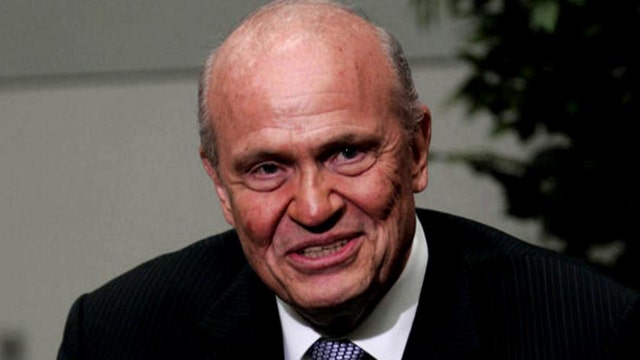Fred Thomson, the former U.S. senator from Tennessee, Republican presidential candidate and “Law and Order” actor, died Sunday after a recurrence of lymphoma. He was 73.
Thompson’s family announced the news in a statement, which was published in The Tennessean.
“It is with a heavy heart and a deep sense of grief that we share the passing of our brother, husband, father, and grandfather who died peacefully in Nashville surrounded by his family,” the statement said.
It continued: "Fred once said that the experiences he had growing up in small-town Tennessee formed the prism through which he viewed the world and shaped the way he dealt with life. Fred stood on principle and common sense, and had a deep love for and connection with the people across Tennessee whom he had the privilege to serve in the United States Senate. He enjoyed a hearty laugh, a strong handshake, a good cigar, and a healthy dose of humility. Fred was the same man on the floor of the Senate, the movie studio, or the town square of Lawrenceburg, his home."
"Fred believed that the greatness of our nation was defined by the hard work, faith, and honesty of its people. He had an enduring belief in the exceptionalism of our country, and that America could provide the opportunity for any boy or girl, in any corner of our country, to succeed in life. "
Thompson, born in 1942, served in the Senate from December 1994 to January 2003.
Following his time in the Senate, Thompson played District Attorney Arthur Branch on Law & Order for five seasons, leaving the show to run for president.
Thought to be a contender during the early stages of the 2008 Republican presidential primary cycle, Thompson drew little support in many of the early states and he took a big hit when the former Southern senator failed to win South Carolina. He eventually dropped out in late January.
After leaving the race, he campaigned extensively for presidential nominee John McCain, and briefly sought support to become chairman of the Republican National Committee before quitting after a few months.
"Fred Thompson lived life to the very fullest," said Senate Majority Leader Mitch McConnell, R-Ky. in a statement. "The first in his family to go to college, Fred would go on to become Watergate lawyer, Senate colleague, presidential candidate, radio personality, and icon of silver and small screen alike who didn't just take on criminals as an actor but as a real-life prosecutor too."
Thompson's rise to the Senate was atypical. He had never before held public office, but he overwhelmingly won a 1994 special election for Al Gore's old Senate seat after connecting with voters. In 1996 he easily won a six-year term.
The son of a car salesman, Thompson was born in Sheffield, Ala., and grew up in Lawrenceburg, Tenn., where he was a star athlete. He was 17 when he married Sarah Lindsey. The couple, who divorced in 1985, lived in public housing for a year as newlyweds.
Thompson graduated from Memphis State University in 1964 and earned his law degree from Vanderbilt University in 1967. To pay for school, he worked at a bicycle plant, post office and motel.
Thompson went on to become a lawyer in Nashville. In 1969, he became an assistant U.S. attorney, then volunteered in 1972 to work on the re-election campaign of former Republican Sen. Howard Baker. A year later, Baker selected Thompson to be chief minority counsel on the committee investigating the Watergate scandal.
Afterward, Thompson returned to Tennessee and represented Marie Ragghianti, the head of the Tennessee Parole Board who was fired in 1977 after exposing a pardon-selling scheme. Ragghianti won reinstatement and her case was made into a 1985 movie titled "Marie," based on the 1983 book "Marie: A True Story," by Peter Maas. The producers asked Thompson to play himself, which launched his acting career.
"Fred Thompson served the people of Tennessee and America with great honor and distinction," said Sen. Bob Corker, R Tenn. in a statement Sunday night. "From the courtroom to Capitol Hill to Hollywood, his larger than life personality was infectious and had a way of making all of those around him strive to be better."
Thompson once called the Senate a "remarkable place" but, like Hollywood, said there was "frustration connected with it." He said he was disappointed the Governmental Affairs Committee didn't get more time in 1997 to investigate the fund-raising practices of the 1996 presidential election.
Some thought his high-profile role as chairman of the hearings could launch a presidential bid. That did not materialize in 2000 after the hearings were dismissed as political theater.
"They ran me for a while and then they took me out of the race, and all the time I was kind of a bystander," Thompson said in 2002 about speculation over his presidential prospects two years earlier.
Just before leaving the Senate, Thompson told the Associated Press that too much time was spent on meaningless matters and partisan bickering.
"On important stuff, where the interests are really dug in on both sides, it's extremely difficult to get anything done," he said at the time.
In June 2002, Thompson married Jeri Kehn, a political and media specialist.
After retiring from politics, Thompson hosted a conservative radio talk show between 2009 and 2011 and became a TV advertising pitchman for American Advisers Group, a reverse mortgage financial company.
The Associated Press contributed to this report.










































